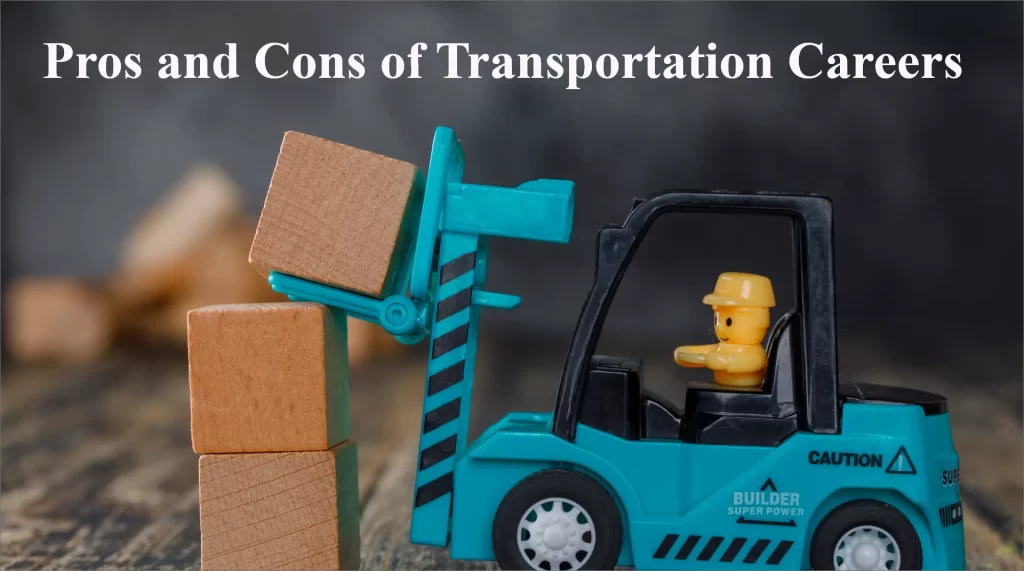Is Transportation a Good Career Path? A Career Guide
Yes, the transport industry offers a variety of exciting career options and many jobs with above-average pay. Many businesses’ supply chains depend on the transportation sector, which offers various career options. There are many jobs in transporting products and people or planning their transportation that you may pursue depending on your abilities and interests.
Furthermore, this industry is predicted to grow by 6% over the next few years, and many businesses are providing substantial welcome packages due to the labor shortage.
This article will explain why a career in transportation can be a suitable choice for those looking for stability, growth, and a variety of work options and will enlighten you on the many opportunities such a career might present.
What is a Transportation Career?
Careers in transportation involve moving goods and people from one location to another. Transportation is a part of logistics. However, logistics is a far more comprehensive field. These professionals are crucial for managing the supply chain, transferring people for both work and pleasure and providing customers with essential goods.
There are numerous employment opportunities in goods transportation, including those for truck drivers, pilots, and train engineers.
When discussing a transportation career, two terms are frequently used. Let’s explore these terms to understand the transportation industry better.
1. Transportation
This term refers to transporting goods and people from one place to another and the means used for transportation, i.e., vehicles and trains. Driving a bus, running a train, and operating a plane are parts of the process.
2. Logistics
The process of planning and managing the adequate storage and transportation of goods from the point of production to the point of consumption is known as logistics. The process involves inventory management, shipping, and tracking of the goods. The logistics aims to provide cost-effective and timely consumer service.
While they are closely connected, there are differentiating points as well. Transportation shifts people and goods from one location to another, and the planning behind this activity is called logistics. Logistics professionals plan, coordinate, and track the movement of goods until people or goods reach their destination.
An effective logistics plan ensures the transportation process is safe and efficient. Learning the differences between both processes enables you to find suitable career options.
Benefits of a Transportation and Logistics Career
A transportation and Logistics career is an exciting option for various reasons.
Some of the attraction points include:
- It allows you to explore new places daily, expanding your horizons and worldview. You encounter different people and learn things you never expected before.
- The transportation and Logistics career offers competitive salaries and benefits, making it a viable choice for those seeking financial stability.
- There is a huge gap in supply and demand, and future job opportunities are projected to grow considerably in transportation and logistics. Dedicated and committed individuals can leverage this opportunity for a longer and secure career.
- Another significant aspect is that despite doing repetitive tasks, you never get bored. Visiting new places and meeting different people is exciting and provides the opportunity to learn about different cultures, languages, food tendencies, and weather.
Pre-Requisites and Qualification
Many transportation and logistics career options don’t require a college degree. Although specific jobs may require training or certificates, most do not require four-year degrees, and many offer promising career pathways.
A transportation career might be an excellent option for the uneducated and undereducated workforce.
Different Stages of Logistics and Transportation
The movement of goods is complicated and requires careful planning and execution. Likewise, transportation skills and expertise are required for a successful transportation career.
The process of logistics and transportation is spread over many stages. Since each stage is essential and demands focus,
Let’s understand the stages of logistics and transportation.
i. Planning
Choosing the most effective and economical method to move items from one location to another is the purpose of the planning stage.
It considers things like picking the best means of transportation, figuring out the best route, and calculating the cost and time required. Careful planning is the foundation of a successful transportation process.
ii. Warehousing
Before and after shipping, products are stored and managed throughout this phase. It involves tasks including order fulfillment, inventory management, and packing.
Through effective warehousing, products can be stored and managed effectively.
iii. Transportation
Moving the items physically from the point of origin to the destination is the goal of the transportation stage.
Shifting goods and people can be accomplished via various transportation methods, including trucks, ships, or airplanes.
iv. Delivery
Final delivery of the items to the intended recipient or client is part of this stage. Coordination with stakeholders may be necessary, including carriers, retailers, and end users.
Delivery is a consumer-focused activity that marks the end of a process that starts with the planning and production of the goods.
Job Opportunities in Transportation and Logistics
We have gained sufficient knowledge of transportation and logistics with the above details.
Let’s explore the available job options.
i. Sourcing Department
The process of sourcing, which involves selecting the suitable goods and services that a company needs to run its business, is crucial to the supply chain.
The sourcing department’s task list includes purchasing products, choosing vendors, negotiating contracts, and assessing your suppliers’ long-term performance.
Sourcing professionals discover suppliers, assess the quality of the products, and get materials within a set budget using their research and negotiation abilities.
ii. Logistics
Transportation, warehousing, inventory control, order fulfillment, and materials handling are essential. Jobs in logistics are generally available in various sectors that need to streamline their operations.
Logistics specialists use their excellent project management and planning skills to coordinate the effective procurement and distribution of goods and resources between different locations.
iii. Warehouse Operations
A set of measures that ensure that items move through the warehouse smoothly is known as warehouse operations. Collecting, organizing, fulfilling, and distributing orders are all included in warehouse operations.
Employers in the warehouse are looking for employees with coordination, multitasking, and strategic planning skills.
iv. Distribution
Distribution professionals are in charge of the adequate transportation of goods and raw materials to meet demand.
Cargo or commercial pilots, ship captains, and truck drivers can travel for work and explore new areas while carrying out their tasks.
Pros and Cons of a Transportation Career

Like every other career, a long-term transportation career has benefits and drawbacks.
While the versatility, potential opportunities, and prospects are great pushers, disturbed personal life and challenging weather conditions could be red flags for a transportation career.
For a detailed understanding, here are some Pros and Cons of choosing a transportation and logistics career.
Pros of Transportation Career
1. Technology-Driven Opportunities
Technology has transformed transportation, logistics, and communication by introducing cutting-edge technology and reshaping transportation. Technology enables people to travel faster and reach destinations way before they used to in the past.
Electric vehicles and trains have contributed to the growth of a sustainable transportation system. Besides sustainability and fast traveling services, technology has opened the gate for many new opportunities, and demand for professional transport, logistics, and communication workers has increased manifold.
2. Market Competitive or Higher Income Potential
Transportation is one of the highest-grossing industries worldwide, with enormous earning potential. Massive demand projections will further boost the revenue, increasing the chances of salary hikes for professionals and workers.
Not just pay, bonuses, incentives, and commissions will also be higher than now. So, this might be the golden opportunity and appropriate opportunity to enter the promising transportation sector.
3. Training and Education Opportunities
Continuous training is essential for updated knowledge and understanding of newer technologies to keep up with the ever-evolving demand and fast-changing technology. Companies require motivated, dedicated, and knowledgeable professionals to manage their operations.
For that purpose, companies and businesses arrange workshops and training sessions for their employees regularly. So, if you are interested in professional growth and development through education and training, have a go in the transportation industry.
4. Fulfillment and Satisfaction
Transportation workers and professionals are creating a significant impact, contributing daily value to people’s lives. Suppose transportation systems are halted for only one day or even half or fewer hours. In that case, supply chains are broken, and product delivery is delayed, creating a shortage that ultimately negatively affects consumers.
Also, transport professionals are always busy researching and developing innovative infrastructure and efficient transport options. Their considerable impact on society provides workers and professionals with a fulfilling emotion and enhanced job satisfaction.
Cons of Transportation Career
1. Income Variation and Fluctuation
As transportation is a fast-paced and dynamic industry, income fluctuates occasionally. Many factors can influence income patterns, including supply and demand gaps, fuel prices, and vehicle maintenance costs.
In this background, earning a consistent income could be very difficult. So, if you always require set income patterns to manage your expenses, you should consider another industry as your career.
2. Work-life Imbalance
For many people, achieving a work-life balance is crucial for living a happy and fulfilling life financially and emotionally. A transportation career might sometimes significantly derail this balance, disturbing family life. Truck drivers, operators, and vehicle facilitators may need to stay on the job for long hours.
This inflexible schedule and lengthy working hours leave less time for them to spend with their families. For those who prioritize family over work and are committed to maintaining a near-perfect balance between work and family, a transport career is a big no.
3. Harsh Weather Conditions
Truck drivers, train operators, and other transport workers often face harsh weather conditions, which make their work even harder. Furthermore, people on roads are constantly exposed to the dangers of accidents and injuries. The pressure of timely delivery adds another layer of risk to the lives of transportation workers. Driving in bad weather conditions sloppy and slippery roads after rains could be tricky, endangering their lives.
Also, Transportation professionals should avoid the health effects of extended sitting by wearing compression garments, getting frequent rests, and expanding their muscles.
Final Thought - Transportation Career Path
Finally, pursuing a career in transportation is an excellent idea. It’s a fascinating sector to work in, with various options and prospects for career progress. A career in transportation has much potential because it provides stability, various job options, and ongoing training and advancement.
As the need for transport services increases, the sector offers stability and long-term job security. It is vital to understand that careers in transportation require high levels of communication, problem-solving skills, and the capacity to multitask. Customer service skills will be essential if you move people rather than goods.
After discovering and understanding all the job opportunities the transport industry offers, you can start your journey to a fulfilling and prosperous professional future.
FAQs - Career in Transportation
No particular degrees or certifications are required for most jobs in transportation and logistics. While it’s not necessarily required, getting a logistics or transportation management degree can help you grow in your career. Organization, problem-solving, communication, and attention to detail are crucial and in-demand skills for a promising career in the transport industry.
Some of the highest-paying jobs in the transportation industry include commercial airline pilots, ship captains, and truck drivers. Earnings from these positions frequently exceed $100,000 per year.
A transport planning career holds a vast potential for growth and earning. Additionally, you can shift between the municipal and federal administrations or the public and private sectors. Leading big teams as a senior transport officer and planning and execution roles are some promising career options in the transport industry.
The actual shifting of goods via land, sea, and air transportation is the primary focus of the transportation industry. The operations that support product delivery management within the supply chain fall under the considerably broader logistics category.
Read More : How Many Weeks in a Year? A Comprehensive Look
Read More : Why Monitoring Applications is Important?
